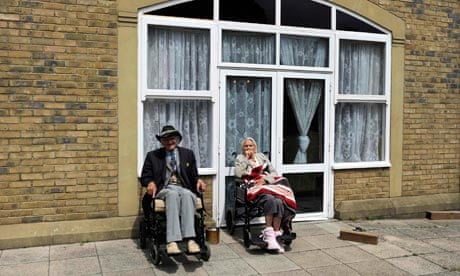The new owners of care homes inherited from Southern Cross have hit back at claims by the GMB trade union that employees are owed £150m in compensation.
In a letter to MPs, NHS trusts and care home commissioners, representatives of care home operators who took over the majority of the Southern Cross estate say they will fight the GMB claim. The union is alleging that Southern Cross failed to consult employees properly when it was broken up last year, entitling staff individually to 13 weeks' pay in compensation.
"We believe that the GMB claims are unwarranted and have no merit," the letter states. "We will contest them robustly and are confident of the strength of our position."
Crippled by the consequences of an ill-judged sale-and-leaseback programme, Southern Cross collapsed last year, throwing into doubt the future of 750 homes that housed 31,000 residents and employed 44,000 people. The company was broken up and handed back to its landlords, with other operators taking over the homes and negotiating new rent terms.
The letter – sent by a public relations firm representing the operators, adds: "We must emphasise that the GMB was kept fully informed throughout the process. They were given full information. They attended the consultation meetings. They signed off on the consultations. In the light of this their current actions are surprising and particularly so, given that one outcome was the avoidance of large scale redundancies amongst care home staff and a seamless transfer of the care framework for residents in the homes."
The letter does not say whether the new owners can afford the claim if the GMB is successful, although it warns that the legal challenge could cause concern to residents, families and employees if the dispute became more widely known.
Justin Bowden, the GMB's national officer for the care sector, disputed the claim that Southern Cross's landlords had held a proper consultation with staff and unions over the company break-up.
"GMB warned them at the time that they were breaking the rules but they pressed on regardless," he said. "That is why GMB filed this claim, and we are confident we will succeed in getting it upheld."
The Southern Cross collapse sparked a political storm, largely driven by the financial engineering of its balance sheet under private equity owners. It prompted the Labour leader, Ed Miliband, to label buy-out groups as "asset strippers".
Southern Cross buckled under the weight of a £250m annual rent bill, which had to be paid while fees from local councils were falling because of public spending cuts.
About a third of the former Southern Cross homes will be run as a joint venture between NHP, the company's biggest landlord, and Court Cavendish, a care consultancy run by the former head of the Priory clinics, well-known for their treatment of addictions.
